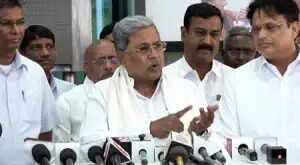Karnataka's Caste Census Sparks Controversy: What You Need to Know
Caste Census Report Unveiled in Karnataka

Bengaluru: The contentious caste census report presented by the Backward Classes Commission to Karnataka's Congress-led administration has estimated the Muslim demographic at 18.08 percent, suggesting an increase in their reservation from 4 percent to 8 percent, as confirmed by sources on Sunday.
The report was delivered to the state cabinet on April 10, and a special cabinet meeting is scheduled for April 17 to deliberate on its recommendations. Although no formal announcement has been made, details have emerged publicly.
Additionally, the report advocates for raising the overall reservation cap in Karnataka to over 75 percent. It estimates the population of Other Backward Classes (OBCs) at 4.18 crore, Scheduled Castes (SCs) at 1.09 crore, and Scheduled Tribes (STs) at 42.81 lakh.
Sources indicate that OBCs make up approximately 70 percent of the state's population.
A key recommendation is to elevate the OBC reservation from the current 31 percent to 51 percent.
The report categorizes the Muslim population under Category 2B, totaling 75.25 lakh, and proposes an increase in their reservation. This figure surpasses that of the Vokkaliga community, which is currently the second-largest group in the state at 10.31 percent, with a population of 61.68 lakh. The report suggests a rise in their reservation to 7 percent.
The Lingayat community, which is presently the largest in Karnataka, has a population of 66.35 lakh (11.09 percent), with a recommendation to increase their reservation to 8 percent.
The SC population is the highest in the state, with the report maintaining their reservation at 24.1 percent. The ST population stands at 42.81 lakh, with a recommended reservation of 9.95 percent.
A newly established Category 1A, which includes marginalized groups like Golla, Uppara, and Mogaveera, has a population of 73.92 lakh, with a proposed reservation of 12 percent.
Category 2A, which encompasses communities such as Madivala and Ediga, has a population of 77.78 lakh, with a suggested reservation of 10 percent.
The findings of this report are anticipated to ignite significant debate and could alter the political dynamics in the state.
Home Minister G. Parameshwara and Minister Zameer Ahmad Khan have previously defended the Muslim quota in tenders, asserting that Muslims represent between 16 to 18 percent of Karnataka's population.
Congress leaders have expressed readiness to raise the reservation limits in the state. Labour Minister Santhosh Lad noted that the Central government has already exceeded the 50 percent cap by implementing a 10 percent reservation for Economically Weaker Sections (EWS).
Congress MLC B.K. Hariprasad emphasized that the caste census provides the government with the necessary data to justify increasing the reservation limit beyond 50 percent.
Deputy Chief Minister D.K. Shivakumar stated that the government will approach the caste census report with caution.
When questioned about the cabinet discussions regarding the report, Shivakumar mentioned that while the Law Minister had opened the report, no MLA or minister had reviewed it yet. A thorough discussion is planned.
Both the Vokkaliga and Lingayat communities have criticized the caste census report as flawed.
Sources reveal that the report was submitted in over 46 volumes, along with two CDs containing various aspects of the caste survey.
In 2014, then-Chief Minister Siddaramaiah initiated the Karnataka Socio-Economic and Educational Census, which was conducted by a committee led by H. Kantharaju at a cost of approximately Rs 169 crore. Although the report was completed by 2016, it was shelved by subsequent administrations.
The Congress and JD(S) coalition government under H.D. Kumaraswamy and the BJP government led by B.S. Yediyurappa and Basavaraj Bommai also delayed the report's release.
In 2020, the BJP-led Karnataka government appointed Jayaprakash Hegde as the Commission chief, but the report remained unpublished.
Hegde finally submitted the completed report to the Siddaramaiah government on February 29, 2024. Opposition parties, including the BJP and JD(S), have voiced their opposition to the report's implementation.
Communities such as the Lingayats and Vokkaligas have claimed that the report misrepresents their population.
Leader of Opposition R. Ashoka criticized the caste census report as unscientific, stating that the census team did not visit every household. He argued that the report was politically motivated and would not be accepted by the public. While he supports the idea of a caste census, he believes this particular report aims to create discord among castes for political gain.
Karnataka Chief Minister Siddaramaiah has asserted that the caste census was conducted scientifically and that his government will implement its findings without hesitation. He affirmed, "Our government supports the caste census. We have accepted the caste census report and will certainly implement it in the coming days. There is no need for any doubt regarding this."
